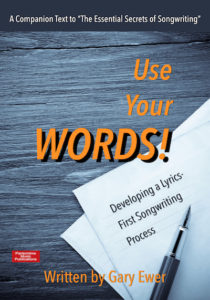It’s not hard to find songwriters who find the writing of the lyrics to be the most difficult part of the process. You know what you want to write about, but every time you try to put it in the form of a lyric, your words sound confused, disorganized, or just plain corny.
 It’s time to get really serious about your lyric-writing abilities. Time to develop a reliable lyrics-first method. This new eBook is FREE with your purchase of “The Essential Secrets of Songwriting 10-eBook Bundle”: “Use Your Words! Developing a Lyrics First Songwriting Process.”
It’s time to get really serious about your lyric-writing abilities. Time to develop a reliable lyrics-first method. This new eBook is FREE with your purchase of “The Essential Secrets of Songwriting 10-eBook Bundle”: “Use Your Words! Developing a Lyrics First Songwriting Process.”
Like most things in the creative arts, knowing that you’ve got a problem doesn’t necessarily mean you’ve got the solution. So let’s take a quick look at three typical lyric-writing issues you may be facing these days, and then consider some possible solutions:
1. MY LYRICS SOUND BORING
It happens this way: you know what you want to write about, but when you read what you’ve come up with for a lyric, you wonder,”Why the heck am I even reading this??” If this describes you, here are two likely causes:
- Your lyrics don’t progress naturally, line to line. You’ve been using a “stream of consciousness” style of writing that prevents the listener from finding a logical progression through your lines of lyric.
- Your lyrics don’t use imagery, or use imagery in a scattered, haphazard way. Good lyrics will use metaphor, simile and other interesting poetic devices. But if they’re simply clouding what you’re actually writing about for no good reason, your audience will find their minds wandering.
A solution? Read through your lyric using the “because I said this, I then said that” approach. Read your first line, consider it, then read the next line. Is it a logical follower? Does that second line happen as a direct result of what happened in the first line? There is this sort of logic even in abstract lyrics, and you need to see it when you go line by line.
When imagery is used well, a simple line says much. Be sure that imagery and metaphors you use aren’t simply confusing people.
2. MY LYRICS DON’T SOUND LIKE SOMETHING I’D SAY
Your lyrics are your opportunity to express yourself, but sometimes your words don’t appear to be saying what you intended them to say, or they just don’t sound like you. This might mean:
- The song is going in a new, unintended direction; or
- You haven’t spent enough time identifying the point of the lyric.
- You haven’t thought enough about what you would normally say on this topic.
Your solution here is to spend more time at the initial stage of identifying the actual topic for your song. One of the best ways to do this is to write a short story as a first step. One or two pages long should do it.
That short story will allow you to find the actual sequence of events that will eventually get converted to a song lyric. This doesn’t mean that your song needs to be a story song; you can do this even if you’re writing about a feeling, an opinion, or some other kind of non-story. The short story gives you the chance to sort out your creative process, and identify what you’re actually writing about.
3. MY LYRICS SOUND CORNY AND CLICHÉ
You read your lyrics and find that you’ve been resorting to an abundance of hackneyed expressions and meaningless “Ooh baby I need you” phrases. How do you get more meaning into what you’re writing?
The solution is to spend more time creating word lists for your lyric. Write the general topic down on a sheet of paper, then brainstorm a list of words that pertain to that topic. Try two lists: one with observational, “unemotional” words that might work in a verse, and another more emotional list for words to use in your chorus.
The main benefit to word lists is that they give you an ample vocabulary for your lyric, and help you avoid meaningless clichés. Word lists also give you the opportunity to identify what you actually want to write about.
For example, you may have thought that your song was simply going to be about your latest breakup, but as you work out lists, you find that what you’ve really been thinking about is something deeper: how you feel you’ve been generally treated by your significant other, for example.
Getting Better
No matter what your lyric problems are, the best way to get better is to practice. Spend some time every day writing lyrics. Try something small, like writing simple pairings of lines based on a topic you choose. Try rhyming, non-rhyming, abstract, realistic… any exercise is good exercise.
Also, be sure to read good lyrics every day. Research your genre of choice, and find the lyricists that you like. Make objective observations about what you like. The more you read good lyrics, the more you learn, and the better you own technique will become.
 Written by Gary Ewer. Follow Gary on Twitter.
Written by Gary Ewer. Follow Gary on Twitter.
 “The Essential Secrets of Songwriting” eBook bundle comes with a free copy of “Use Your Words! Developing a Lyrics-First Songwriting Process”. Learn how to put the writing of lyrics front and centre in your songwriting method.
“The Essential Secrets of Songwriting” eBook bundle comes with a free copy of “Use Your Words! Developing a Lyrics-First Songwriting Process”. Learn how to put the writing of lyrics front and centre in your songwriting method.











Pingback: What Causes Musical Boredom? | The Essential Secrets of Songwriting